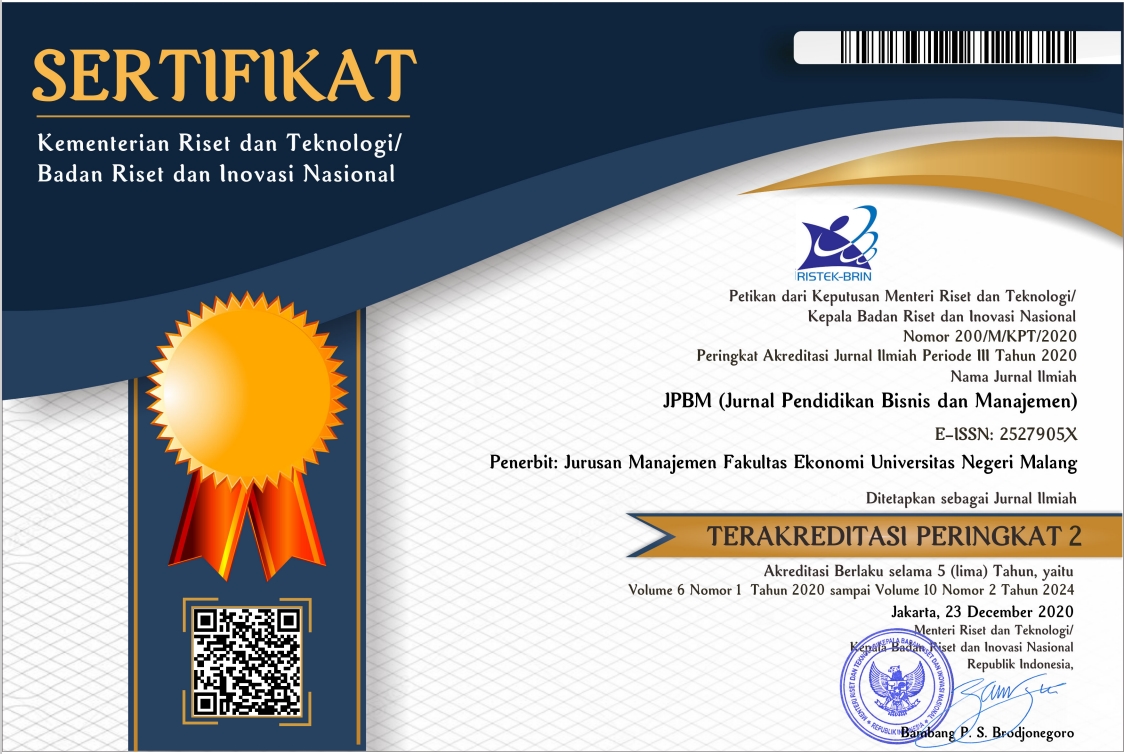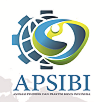Unlocking Growth: Exploring How Social Capital, Organizational Learning Capability Shape Business Performance through Business Model Innovation
Abstract
This study focuses on revealing the power of social capital and organizational learning capabilities to increase business performance by using business model innovation as a mediation variable. The population of this study was micro and small enterprises in Palembang amounting to 1.103 SMEs and the sample used was 172 SMEs. The sampling technique uses purposive sampling assuming micro and small enterprises are still actively running their businesses until Agustus 2023. Data analysis uses an SEM-based structural model approach. The survey findings revealed that social capital could significantly improve business model innovation but not for business performance. Organizational learning capabilities could significantly improve business model innovation and performance. Then, business model innovation can reinforce social capital ties, organizational learning capabilities, and business performance. This survey expands the existing knowledge by scrutinizing the role of business model innovation as mediation between social capital and organizational learning capabilities, and, hence, makes a notable adjunct to the existing knowledge in the micro and small enterprises context by concentrating on the connection between social capital, organizational learning capability, business model innovation, and business performance.
Keywords: Business model innovation, Business performance, Organizational learning capabilities, Social capital, SMEs
Full Text:
PDFReferences
Agyapong, F. O., Agyapong, A., & Poku, K. (2017). Nexus between social capital and performance of micro and small firms in an emerging economy: The mediating role of innovation. Cogent Business and Management, 4(1), 1–20. https://doi.org/10.1080/23311975.2017.1309784
Akintimehin, O. O., Eniola, A. A., Alabi, O. J., Eluyela, D. F., Okere, W., & Ozordi, E. (2019a). Social capital and its effect on business performance in the Nigeria informal sector. Heliyon, 5(7), e02024. https://doi.org/10.1016/j.heliyon.2019.e02024
Al-Omoush, K. S., Ribeiro-Navarrete, S., Lassala, C., & Skare, M. (2022). Networking and knowledge creation: Social capital and collaborative innovation in responding to the COVID-19 crisis. Journal of Innovation & Knowledge, 7(4), 1–11. https://doi.org/https://doi.org/10.1016/j.jik.2022.100181
Ali Latifi, M., Nikou, S., & Bouwman, H. (2021). Business model innovation and firm performance: Exploring causal mechanisms in SMEs. Technovation, 107(May 2020), 102274. https://doi.org/10.1016/j.technovation.2021.102274
Anwar, M. (2018). Business model innovation and SMEs performance-Does competitive advantage mediate? International Journal of Innovation Management, 22(7), 1–31. https://doi.org/10.1142/S1363919618500573
Asemokha, A., Musona, J., Torkkeli, L., & Saarenketo, S. (2019). Business model innovation and entrepreneurial orientation relationships in SMEs: Implications for international performance. Journal of International Entrepreneurship, 17(3), 425–453. https://doi.org/10.1007/s10843-019-00254-3
Bae, B., & Choi, S. (2021). The effect of learning orientation and business model innovation on entrepreneurial performance: Focused on South Korean start-up companies. Journal of Open Innovation: Technology, Market, and Complexity, 7(4). https://doi.org/10.3390/joitmc7040245
Bashira, M., Alfaliha, A., & Pradhan, S. (2023). Managerial ties, business model innovation & SME performance: Moderating role of environmental turbulence. Journal of Innovation & Knowledge, 8(1), 1–12. https://doi.org/https://doi.org/10.1016/j.jik.2023.100329
Beltagui, A. (2018). A design-thinking perspective on capability development: The case of new product development for a service business model. International Journal of Operations and Production Management, 38(4), 1041–1060. https://doi.org/10.1108/IJOPM-11-2016-0661
Boohene, R. (2018). Entrepreneur’s social capital and firm growth: The Moderating role of access to finance. Journal of Enterprising Culture, 26(03), 327–348. https://doi.org/10.1142/s0218495818500127
Bouwman, H., Nikoub, S., & Reuver, M. de. (2019). Digitalization, business models, and SMEs: How do business model innovation practices improve performance of digitalizing SMEs? Telecommunications Policy, 43(9), 1–18. https://doi.org/10.1016/j.telpol.2019.101828
Butticè, V., Colombo, M. G., & Wright, M. (2017). Serial crowdfunding, social capital, and project success. Entrepreneurship: Theory and Practice, 41(2), 183–207. https://doi.org/10.1111/etap.12271
Cao, X., & Ali, A. (2018). Enhancing team creative performance through social media and transactive memory system. International Journal of Information Management, 39(November 2017), 69–79. https://doi.org/10.1016/j.ijinfomgt.2017.11.009
Chen, L., Zhu, F., & Mantrala, M. (2021). The path of support-to-sales: mediating role of seller collaborative information exchange in social commerce. European Journal of Marketing, 55(2), 363–384. https://doi.org/10.1108/EJM-11-2019-0823
Chen, Y., Chen, L., & Smith, R. (2022). Linking passion to performance in the social commerce community: The role of collaborative information exchange. Journal of Business Venturing Insights, 18(October). https://doi.org/10.1016/j.jbvi.2022.e00351
Dhir, A., Jahan, S., Islam, N., Ractham, P., & Meenakshi, N. (2023). Drivers of sustainable business model innovations. An upper echelon theory perspective. Technological Forecasting & Social Change, 191(6), 1–17. https://doi.org/10.1016/j.techfore.2023.122409
Duchek, S. (2020). Organizational resilience: a capability-based conceptualization. Business Research, 13(1), 215–246. https://doi.org/10.1007/s40685-019-0085-7
Easmon, R. B., Kastner, A. N. A., Blankson, C., & Mahmoud, M. A. (2019). Social capital and export performance of SMEs in Ghana: the role of firm capabilities. African Journal of Economic and Management Studies, 10(3), 262–285. https://doi.org/10.1108/AJEMS-11-2018-0361
ElNaggar, R. A. A., & ElSayed, M. F. (2023). Drivers of business model innovation in micro and small enterprises: evidence from Egypt as an emerging economy. Future Business Journal, 9(1). https://doi.org/10.1186/s43093-022-00180-2
Fandiño, A. M., Marques, C. M. V. A., Menezes, R. M. P. de, & Bentes, S. M. R. (2015). Organizational Social Capital Scale Based On Nahapiet and Ghosal Model: Development and Validation. Review of Contemporary Business Research, 4(2). https://doi.org/10.15640/rcbr.v4n2a3
Farzaneh, M., Ghasemzadeh, P., Nazari, J. A., & Mehralian, G. (2020). Contributory role of dynamic capabilities in the relationship between organizational learning and innovation performance. European Journal of Innovation Management, 24(3), 655–676. https://doi.org/10.1108/EJIM-12-2019-0355
Gölgeci, I., & Kuivalainen, O. (2020). Does social capital matter for supply chain resilience? The role of absorptive capacity and marketing-supply chain management alignment. Industrial Marketing Management, 84(May), 63–74. https://doi.org/10.1016/j.indmarman.2019.05.006
Gomes, G., Seman, L. O., Berndt, A. C., & Bogoni, N. (2022). The role of entrepreneurial orientation, organizational learning capability and service innovation in organizational performance. Revista de Gestao, 29(1), 39–54. https://doi.org/10.1108/REGE-11-2020-0103
Gomes, G., & Wojahn, R. M. (2017). Organizational learning capability, innovation and performance: study in small and medium-sized enterprises (SMES). Revista de Administração, 52(2), 163–175. https://doi.org/10.1016/j.rausp.2016.12.003
Haile, E. A., & Tüzüner, V. L. (2022). Organizational learning capability and its impact on organizational innovation. Asia Pacific Journal of Innovation and Entrepreneurship, 16(1), 69–85. https://doi.org/10.1108/apjie-03-2022-0015
Hair, J. . F., Black, W. C., Babin, B. J., & Anderson, R. E. (2019). Multivariate data analysis. In A. Ainscow (Ed.), Book (Eighth Edi). Cengage Learning EMEA.
Hayes, A. F., & Scharkow, M. (2013). The relative trustworthiness of inferential tests of the indirect effect in statistical mediation analysis: Does method really matter? Psychological Science, 24(10), 1918–1927. https://doi.org/10.1177/0956797613480187
Hussain, A., Khan, M., Rakhmonov, D. A., Mamadiyarov, Z. T., Kurbonbekova, M. T., & Mahmudova, M. Q. K. (2023). Nexus of training and development, organizational learning capability, and organizational performance in the service sector. Sustainability (Switzerland), 15(4). https://doi.org/10.3390/su15043246
Islam, M. M., Habes, E. M., & Alam, M. M. (2018). The usage and social capital of mobile phones and their effect on the performance of microenterprise: An empirical study. Technological Forecasting and Social Change, 132(January), 156–164. https://doi.org/10.1016/j.techfore.2018.01.029
Kanini, K. S., Muathe, S. M. A., & Bula, H. O. (2022). Social capital, organizational innovation and performance of manufacturing msmes in Kenya. International Journal of Social Science and Education Research Studies, 02(10), 517–534. https://doi.org/10.55677/ijssers/v02i10y2022-04
Kannisto, P., Hästbacka, D., & Marttinen, A. (2020). Information exchange architecture for collaborative industrial ecosystem. Information Systems Frontiers, 22(3), 655–670. https://doi.org/10.1007/s10796-018-9877-0
Khan, S. H., Majid, A., Yasir, M., & Javed, A. (2021). Social capital and business model innovation in SMEs: do organizational learning capabilities and entrepreneurial orientation really matter? European Journal of Innovation Management, 24(1), 191–212. https://doi.org/10.1108/EJIM-04-2020-0143
Ko, W. W., & Liu, G. (2019). How information technology assimilation promotes exploratory and exploitative innovation in the small- and medium-sized firm context: The role of contextual ambidexterity and knowledge base. Journal of Product Innovation Management, 36(4), 442–466. https://doi.org/10.1111/jpim.12486
Kozcu, Y. G., & Özmen, Ö. N. T. (2023). Oganizational learning capability, oganizational resilience, organzational performance, and market turbulunce: A moderated mediation model. Journal of Administrative Sciences, 21(49), 482–503. https://doi.org/10.35408/comuybd.1252398
Lau, A. (2020). New technologies used in COVID-19 for business survival: Insights from the Hotel Sector in China. Information Technology and Tourism, 22(4), 497–504. https://doi.org/10.1007/s40558-020-00193-z
Lefebvre, V. M., Sorenson, D., Henchion, M., & Gellynck, X. (2016). Social capital and knowledge sharing performance of learning networks. International Journal of Information Management, 36(4), 570–579. https://doi.org/10.1016/j.ijinfomgt.2015.11.008
Li, J., Lee, S. C., & Jeong, H. E. (2020). Research on the relationship between social capital and enterprise performance in supply chain environment. Journal of Korea Trade, 24(4), 34–48. https://doi.org/10.35611/jkt.2020.24.4.34
Lin, C. H. V., & Sanders, K. (2017). HRM and innovation: A multi-level organisational learning perspective. Human Resource Management Journal, 27(2), 300–317. https://doi.org/10.1111/1748-8583.12127
Liu, C. H. (2017). The relationships among intellectual capital, social capital, and performance - The moderating role of business ties and environmental uncertainty. Tourism Management, 61, 553–561. https://doi.org/10.1016/j.tourman.2017.03.017
Mardani, A., Nikoosokhan, S., Moradi, M., & Doustar, M. (2018). The relationship between knowledge management and innovation performance. Journal of High Technology Management Research, 29(1), 12–26. https://doi.org/10.1016/j.hitech.2018.04.002
Migdadi, M. M. (2021). Organizational learning capability, innovation and organizational performance. European Journal of Innovation Management, 24(1), 151–172. https://doi.org/10.1108/EJIM-11-2018-0246
Moshtari, M., & Vanpoucke, E. (2021). Building successful NGO–business relationships: A social capital perspective. Journal of Supply Chain Management, 57(3), 104–129. https://doi.org/10.1111/jscm.12243
Orel, M., Mayerhoffer, M., Fratricova, J., Pilkova, A., Starnawska, M., & Horvath, D. (2022). Coworking spaces as talent hubs: The imperative for community building in the changing context of new work. Review of Managerial Science, 16(5), 1503–1531. https://doi.org/10.1007/s11846-021-00487-4
Pham, L. T., & Hoang, H. V. (2019). The relationship between organizational learning capability and business performance. Journal of Economics and Development, 21(2), 259–269. https://doi.org/10.1108/jed-10-2019-0041
Phan, T. T. A. (2019). Does organizational innovation always lead to better performance? A study of firms in Vietnam. Journal of Economics and Development, ahead-of-p(ahead-of-print), 71–82. https://doi.org/10.1108/jed-06-2019-0003
Pollok, P., Lüttgens, D., & Piller, F. T. (2019). How firms develop capabilities for crowdsourcing to increase open innovation performance: The interplay between organizational roles and knowledge processes. Journal of Product Innovation Management, 36(4), 412–441. https://doi.org/10.1111/jpim.12485
Pranowo, A. S., Irawan, T. T., Siregar, Z. M. E., & Jaya, R. I. K. (2022). Knowledge sharing, organizational learning capability, open innovation, and business performance: Evidence from food and beverage SMEs in Indonesia. International Journal of Social Science and Business, 6(4), 561–573. https://doi.org/10.23887/ijssb.v6i4.51214
Purwati, A. A., Budiyanto, Suhermin, & Hamzah, M. L. (2021). The effect of innovation capability on business performance: the role of social capital and entrepreneurial leadership on smes in indonesia. Accounting, 7(2), 323–330. https://doi.org/10.5267/j.ac.2020.11.021
Rachinger, M., Rauter, R., Müller, C., Vorraber, W., & Schirgi, E. (2019). Digitalization and its influence on business model innovation. Journal of Manufacturing Technology Management, 30(8), 1143–1160. https://doi.org/10.1108/JMTM-01-2018-0020
Ritter, T., & Lettl, C. (2018). The wider implications of business-model research. Long Range Planning, 51(1), 1–8. https://doi.org/10.1016/j.lrp.2017.07.005
Salfore, N., Ensermu, M., & Kinde, Z. (2023). Business model innovation and firm performance: Evidence from manufacturing SMEs. Heliyon, 9(6), e16384. https://doi.org/10.1016/j.heliyon.2023.e16384
Spieth, P., Schneider, S., Clauß, T., & Eichenberg, D. (2018). Value drivers of social businesses: A business model perspective. Long Range Planning, 52(3), 427–444. https://doi.org/10.1016/j.lrp.2018.04.004
Tajudeen, F. P., Jaafar, N. I., & Ainin, S. (2018). Understanding the impact of social media usage among organizations. Information and Management, 55(3), 308–321. https://doi.org/10.1016/j.im.2017.08.004
Tortorella, G. L., Cawley Vergara, A. Mac, Garza-Reyes, J. A., & Sawhney, R. (2020). Organizational learning paths based upon industry 4.0 adoption: An empirical study with Brazilian manufacturers. International Journal of Production Economics, 219(June 2019), 284–294. https://doi.org/10.1016/j.ijpe.2019.06.023
Valdez-Juárez, L. E., Gallardo-Vázquez, D., & Ramos-Escobar, E. A. (2019). Organizational learning and corporate social responsibility drivers of performance in SMEs in Northwestern Mexico. Sustainability (Switzerland), 11(20). https://doi.org/10.3390/su11205655
Zhang, F., & Zhu, L. (2019). Enhancing corporate sustainable development: Stakeholder pressures, organizational learning, and green innovation. Business Strategy and the Environment, 28(6), 1012–1026. https://doi.org/10.1002/bse.2298
Zhang, J., Xu, H., & Xiao, X. (2022). The role of organizational learning in mediating the relationship between business model design and innovation performance. Discrete Dynamics in Nature and Society, 2022. https://doi.org/10.1155/2022/1317646
Zhao, X., Lynch, J. G., & Chen, Q. (2010). Reconsidering Baron and Kenny: Myths and truths about mediation analysis. Journal of Consumer Research, 37(2), 197–206. https://doi.org/10.1086/651257
Zhao, Y., & Jie, X. (2018). A study on the relationship between organizational learning and business model innovation. Advances in Economics, Business and Management Research, 56(Febm), 323–326. https://doi.org/10.2991/febm-18.2018.73
DOI: http://dx.doi.org/10.17977/um003v10i22024p129
Refbacks
- There are currently no refbacks.
JPBM (Jurnal Pendidikan dan Bisnis Manajemen) is licensed under a Creative Commons Attribution-NonCommercial-ShareAlike 4.0 International License.
JPBM (Jurnal Pendidikan dan Bisnis Manajemen) is abstracted and indexed in :
















